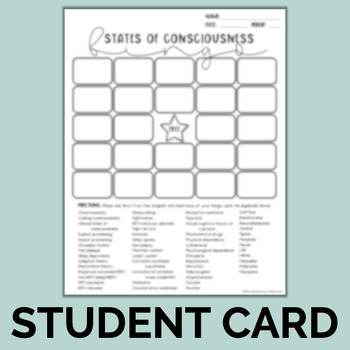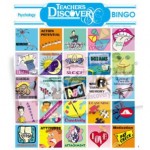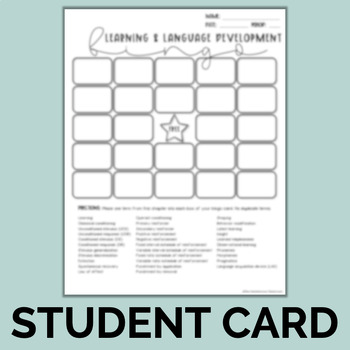


Introduction to Psychology Fact or Myth.You can assign this to your students through GoogleClassroom, they can complete it on a laptop or tablet, and you’ll be able to review their completed work and return feedback, all on the TPT platform.
PSYCHOLOGY CLASS BINGO PDF
This resource (and all other PDF resources in my store) is compatible with the Easel Activities Tool and by purchasing, you will have access to the original PDF as well as a digital version with an interactive layer on top. Scientific Inquiry Domain - Research Methods, Measurement, and Statistics - 1.1 Describe the scientific method and its role in psychology 1.2 Describe and compare a variety of quantitative (e.g., surveys, correlations, experiments) and qualitative (e.g., interviews, narratives, focus groups) research methods 1.3 Define systematic procedures used to improve the validity of research findings, such as external validity 1.4 Discuss how and why psychologists use non-human animals in research 2.1 Identify ethical standards psychologists must address regarding research with human participants 2.2 Identify ethical guidelines psychologists must address regarding research with non-human animals.Scientific Inquiry Domain - Perspectives in Psychological Science - 1.1 Define psychology as a discipline and identify its goals as a science 1.2 Describe the emergence of psychology as a scientific discipline 1.3 Describe perspectives employed to understand behavior and mental processes 1.4 Explain how psychology evolved as a scientific discipline 2.1 Discuss the value of both basic and applied psychological research with human and non-human animals 2.2 Describe the major subfields of psychology 2.3 Identify the important role psychology plays in benefiting society and improving people’s lives.

38 definition cards with terms includedĪPA National Standards for High School Psychology Curricula:.
PSYCHOLOGY CLASS BINGO FREE
This bingo card has a free space and 45 words: Plays violent video games, Commonly has lucid dreams, Is left-handed, Has a poor memory, Takes at least one picture of themselves daily, Perfectionist, Has seen a therapist, Commonly late to class, Commonly anxious, Addicted to technology, Has taken an IQ test, Has conducted a study, Share your favorite field of psychology (free space), Knows what the _ is, Has a favorite psychologist (who?), Majoring or minoring in psychology, Has experienced burnout, Meditates, Has watched Youtube before the age of 10, Thinks in multiple languages, Has taught an animal tricks, Has moved more than 3 times, Sees less than an A as failing/bad, Is squeamish about gore or violence, Has difficulty describing/explaining emotions, Did not live in the nuclear family, Has trained their breath for singing, swimming, yoga, etc, Stand up and have the group give applause, What do you see as a positive relationship?, What are three things you like about yourself?/give yourself a compliment, List three biggest fears, Drank water today and had a good lunch or breakfast, Enjoys studying _ (psychology related), Stims (everyone does this!) (free space), Has a good sleep schedule, Has pulled an all-nighter, What is something this world needs more of?, What is something you are passionate about and would spend hours doing?, What is your love language?, What was your childhood dream? What is your current dream?, What does success look like to you?, Has similar views to parent(s), Enjoys arguing/debating, Has no favorite colors and Opens up the wrong app when trying to find another (stares at calculator instead of weather app) or walks into the wrong room and stands there.In order to review concepts by chapter, students will play bingo by matching terms on their custom bingo card to definition clues.


 0 kommentar(er)
0 kommentar(er)
